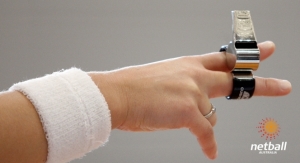Umpires - Official IFNA Fast5 Guidelines
Fast5 GUIDELINES FOR UMPIRES
The following guidelines have been developed to assist umpires to ensure that Fast5 is an exciting, high speed game with wide appeal for players and spectators. They are based on the following principles:
* A focus on “keeping the game moving”
* A high level of teamwork between umpires;
* Reduced use of whistle;
* Clear communication by umpires using hand signals rather than voice wherever appropriate.
1. Increased Teamwork between Umpires
In Fast5, the umpires work together to cover the Court as follows:
* Each Umpire controls the Goal Third to their right (including the Goal Line) and the Side Line nearer to them;
* The umpires work together to control play as it moves through the Centre Third (see details below);
* Irrespective of where the ball is, either umpire may stop play for injury, illness, blood or any other appropriate reason (players may appeal to either umpire).
2. Lead and Trail Umpires
To assist in describing the responsibilities of the two Umpires as they work together, the terms Lead Umpire and Trail Umpire are used (it should be noted that these are used in a different sense from in other sports).
* The Lead Umpire is the umpire whose goal end the ball is moving towards.
* The Trail Umpire is the umpire whose goal end the ball is moving away from.
3. Control of Play through the Centre Third
In the diagram (shown in the attached PDF document), if Team A has possession, the ball is deemed to be moving towards Team A’s goal end (irrespective of the position of the ball) - hence Umpire X is the Lead Umpire and Umpire Y is the Trail Umpire.
If Umpire Y is positioned on the Side Line:
Umpire Y controls Team B’s Goal Third and the entire Centre Third; Umpire X takes up control from the second transverse line and controls only Team A’s Goal Third.
If Umpire Y is positioned on the Goal Line:
Umpire X may take up control from any point in the Centre Third as considered appropriate to play; Umpire X signals the take over by raising an open hand in the air.
4. Start of Play
At the start of each quarter and after each goal, play is started by the Lead Umpire. This means:
* At the start of each quarter, play is started by the Umpire in whose direction play is expected to move;
* After each successful goal, play is restarted by the Umpire in whose half the goal was NOT scored;
* After a stoppage, the Umpires decide who restarts play according to the position of the ball.
5. Reduced Amount of Whistle
* In Fast5 the whistle is not blown to signal a goal. Three different hand signals are used to signify the Goal Point value associated with a successful goal (refer Hand Signals for Fast5). The Scorer will recognize the signal and record the number of goal points that apply (in a Power Play quarter, these goal points will be doubled).
* No whistle is required when the ball goes Out of Court ʹ it should be blown only if players may be uncertain whether the ball is out or not.
6. Clear Communication using Hand Signals
In order to reduce the amount of “noise” used in the game, umpires should use hand signals as far as possible together with signalling the direction of the penalty. Voice communication should be used only when additional clarification is required. Note that the same signal is used for all Contact infringements (refer Hand Signals for Fast5).
7. Keep the Game Moving
Umpires should take reasonable care to ensure that penalties are taken ‘close to where the infringement occurred’ and they should always be taken in the correct Court area. However, this should not involve being over-fussy when there is no particular gain involved (particularly through the Court).
More care may be needed in the Goal Circle when a Penalty Shot is involved, especially when different goal point areas could apply.
In a Penalty Pass/Shot, the player taking the penalty may play the ball before the infringer is in place. However, the player taking the penalty must accept any disadvantage that occurs because the infringer has not had time to be correctly positioned.
Additional balls will usually be available so that play may restart quickly (e.g. after a goal, when the ball goes Out of Court etc).
8. Discipline
Every effort should be made to ensure that any rough, dangerous, persistent and/or deliberate breaking of the Rules is dealt with appropriately. In particular, repeated and/or deliberate infringing should be kept to a minimum by players so that play is not interrupted unnecessarily. Umpires should use appropriate methods for managing such play based on those in the Rules of Netball. The following points should be noted:
Advancing a Penalty - A penalty may be advanced for dissent or if the normal penalty is considered insufficient. However, it is recommended that this is used sparingly and that through the Court it is limited to half of a Third. Advancing a penalty into the Goal Circle is not recommended because of the different goal points that may apply. However, if the ball is already in the Goal Circle, the penalty may be advanced closer to the Goalpost within the same goal point area.
Warnings – If the word ‘warning’ is used by an Umpire, it will indicate to a player that Suspension or Sending Off is likely to follow if there is repetition of the same (or similar) behaviour. The warning should be loud and clear. Umpires can, however, often manage situations well by using less formal wording that conveys a need for player behaviour to change.
Suspension
A Suspension will be for 1 minute and the suspended player remains beside the Score Bench and is overseen by the Reserve Umpire.
Ordering Off
A player is who is ordered off may take no further part in the game. The player remains beside the Score Bench and is overseen by the Reserve Umpire.
Terminating the game
At any time if more than one position is vacant for a team due to suspension or ordering off the Umpire will terminate the game.










Comments
Comment Guidelines: The SportsTG Network is made up of players, families and passionate sports followers like you who have a strong opinion about sport. That's great - we want you to have your say and share your thoughts with the world. However, we have a few rules that you must follow to keep it fun for all. Please don't be rude, abusive, swear or vilify others. Apart from some pretty serious sport sanctions, we also can ban you and report you if things get out of hand. So play fair and have fun, and thanks for your contribution.